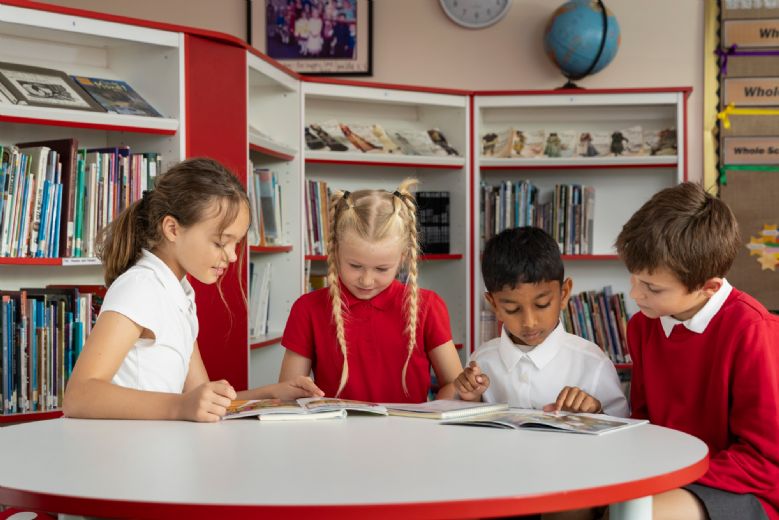Reading

Reading Intent
We aim to provide children with a literacy-rich environment, high quality texts and inspiring learning opportunities, which will help them to:
- Gain a life-long enjoyment of reading and books.
- Read accurately, fluently and with understanding;
- Apply a knowledge of structured synthetic phonics in order to decode unfamiliar words with increasing accuracy and speed;
- Be able to read with expression, clarity and confidence;
- Develop a good linguistic knowledge of vocabulary and grammar;
- Read and respond to a wide range of different types of texts;
- Develop a deeper level of emotional intelligence and empathy;
- Read fluently, and with confidence, in any subject in their forthcoming secondary education.
Reading Implementation
Children at Parklands will develop their reading skills by a variety of means including:
- experiencing reading in a variety of situations so that it becomes a pleasurable and productive experience;
- use the Twinkl Synthetic Phonics programme to deliver daily discrete phonics lessons in EYFS and KS1, enabling children to decode efficiently. This is continued into KS2 where necessary;
- being exposed to quality modelling of reading strategies during shared reading sessions;
- developing reading strategies and discussing texts in detail during guided reading (EYFS/KS1) and whole class reading sessions (Y3-Y6);
- children in KS1 having the opportunity to read 1-1 with an adult at least once a week. As the children move through the school, opportunities to read independently for a sustained period of time are afforded to them;
- having access early on to Rhino Readers which are used to support early readers, linked to our Phonics programme, as well as, ’shared texts' to enjoy with an adult/friend that are broadly linked to the phonics level.
- teaching assistants supporting reading activities to ensure that children have more frequent opportunities to read with adults;
- many exciting and rewarding activities that are arranged in school to promote the pleasure and knowledge that can be gained from books, i.e. the ‘Reading Quest’ and ‘World Book Day’. These include visits by published authors, performances by professional theatre groups, making books and writing book reviews;
- children in Year 5 and Year 6 visiting the local library and having the opportunity to engage in discussions about a text with the authors themselves.
- Implementation of Accelerated Reader to promote reading with the children and help teacher’s make accurate formative and summative assessments of reading
Children in the EYFS and KS1 classes take a book home daily to be shared with parents, either following the Rhino Reader scheme or a 'shared text'. In addition to this, children have the opportunity to choose a book from the school library. Each child has a home school reading record within their school planner that teachers and parents can use to share information about a child’s reading. Parents are encouraged to read with their child daily. Information is given on how to support their child in reading at reading workshops, parent consultations and also in curriculum letters.
In Key Stage 2, children choose books to take home and read from their Acclerated Reader range and the school library. We still encourage all readers to share a book at home with their grown-ups. We believe that this not only helps to develop inferential skills, but also supports a lifelong love of reading. Throughout the Key Stage, children become more independent in recording what they have read in their reading journals. We recognise the value of adults (both in school and at home) reading aloud to children, in order to improve their grasp of story language, enthuse them with a love of books and inspire them as writers.
At Parklands, we have our own library which is well stocked with a wide range of texts which children enjoy. Children have opportunities to use the library and borrow books to read. Staff ensure children are involved in choosing books from the library and that the themes taught throughout the school are represented in the texts available in the library.
In EYFS – Year 2, a different focus group is taught by the teacher or teaching assistant each day. The pupils are taught new skills in order to progress with their reading. These skills are based on the teachers’ assessment and the children’s next steps and based on vocabulary knowledge, inference, prediction, explaining, retrieval and sequencing. Further to the focus group, a carousel of activities is undertaken by the children working independently. The activities are linked to the texts the children are reading and promote the independent application of skills previously taught.
Pupils in Years 3 to 6 take part in daily whole class reading sessions that last for at least 20 minutes. These sessions are built around the teacher reading high-quality and challenging texts, which are dissected by the class through high-level questioning and discussion and include a range of activities. Pupils will have access to the same activities and levels of questioning but with differing levels of support provided depending on pupil needs. The teacher reads the text to the class, modelling fluency, intonation and comprehension, and children follow the text with their own copy as well as reading the text out loud themselves when appropriate. Skilful questioning and discussion is used to help children get to grips with new vocabulary and develop their understanding of the text. At Parklands we use A.P.E (Answer, Prove It, Explain) in independent activities that help children to develop their comprehension of a text. Depending on the activity, pupils may work in mixed-ability groups, pairs or by themselves. Activities do not always need a written outcome, for example, drama may be used to help children explore a character through role play, debates or freeze frames. Teachers will focus on different elements of comprehension e.g. retrieval, inference, deduction, summarising and making predictions.
